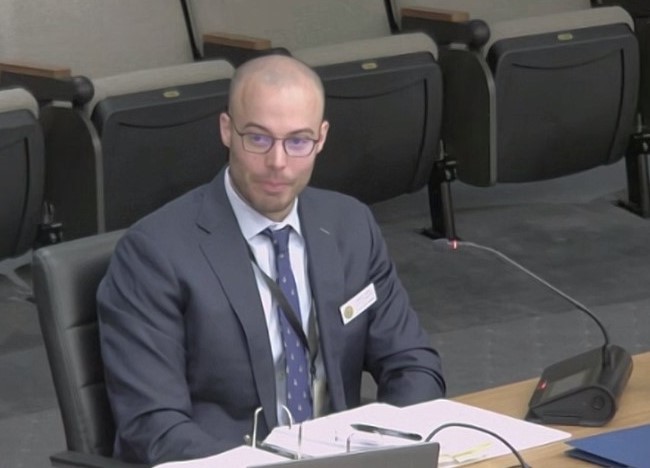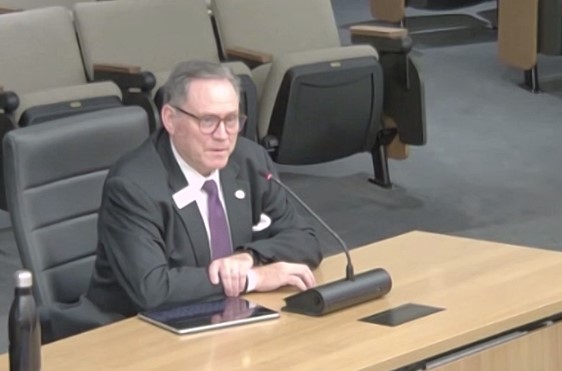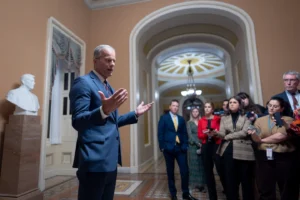Blockchain Firms ‘Chomping At the Bit’ To Develop Wyoming’s Stable Token
Commission scraps plan to launch test token on Ethereum by year’s end
- Published In: Politics
- Last Updated: Nov 17, 2023

State Treasurer and Wyoming Stable Token Commissioner Curt Meier (at right, alongside Commission Chair Gov. Mark Gordon) said he hopes the stable token will be a benefit to the state’s community banks, which have been skeptical of the effort. (Courtesy image from the Wyoming Stable Token Commission via Zoom)
By CJ Baker
Special to the Wyoming Truth
Wyoming’s new stable token won’t go live by the year as once hoped, but state officials are continuing to push forward with an ambitious timeline.
When lawmakers agreed to launch a digital version of the U.S. dollar last winter, they ordered the Wyoming Stable Token Commission to “endeavor” to issue the first $1 token by the end of 2023. It was an ambitious goal, and with time running short last month, the commission considered launching just a test version of the token on the Ethereum blockchain to hit the Dec. 31 date.
Earlier this month, however, the co-chairmen of the Legislature’s blockchain committee, Sen. Chris Rothfuss (D-Laramie) and Rep. Cyrus Western (R-Big Horn), asked the commission to scrap that plan.
“Rather than continuing a course of action to mint a ‘test token’ on a single blockchain simply to meet a deadline, we would encourage the Commission to focus on following through with the work necessary to achieve a widespread release as quickly as is prudent,” Rothfuss and Western wrote on Nov. 8.

They said the commission had already met its obligations under the law, praising the panel’s “diligent efforts.”
Commission Chair Gov. Mark Gordon said he was “relieved, frankly” by the lawmakers’ letter.
“I know we felt a bit under the gun,” said Gordon, who’s taken a cautious approach.
But the commission isn’t easing off the gas too much. Under a timeline approved Thursday, the state will immediately seek out vendors who can develop and provide input on the token. And the commissioners want responses to their “request for information” by Dec. 18.
Building a better mousetrap
Beyond being critical for the crypto-economy, the request argues stable tokens have the potential to be “integrated into everyday retail and commercial financial activities.” The hope is they can power cheaper, faster and more secure transactions.
“A well-designed stable token has the potential to serve as a common interoperable foundation upon which a new payment ecosystem can develop …,” according to a portion of the state’s request.
Each Wyoming stable token will be purchased with and backed by $1 held in the real world. While the tokens are circulating in the digital realm, the state will invest the cash in U.S. treasuries and pocket the profits.
Some other stablecoins use a similar approach, but they’ve been hampered by regulations and questions about their backing. For Wyoming to succeed, Commissioner Joe Revill said the state must show it has “a better regulatory mousetrap” and offer more transparency.

“If we’re able to demonstrate both of those, I think that there’s a very good market opportunity. If we’re not, then I question the market opportunity,” said Revill, who leads a wealth management services company. “And I think that we need to be convinced ourselves that we have both of those things [first] …”
He argued the state, which has yet to pick a use case for its token, should firm up its vision before reaching out to vendors. Revill also questioned whether all the conversations could be had by mid-December, but Commission Executive Director Anthony Apollo said the timeline is realistic.
“I think there’s already enough teams kind of chomping at the bit to speak with us about this — and those are just the ones that have reached out proactively,” Apollo said.
During Thursday’s public comment period, a Wisconsin-based company that’s worked on tokenizing assets, payments and other blockchain solutions said it will respond to the state’s request for information. Lou Morgan of Block Time Financial said his firm has already launched a test version of the Wyoming stable token on the payments-focused blockchain Stellar; the developers of the Cardano blockchain have also said they intend to submit a proposal.
Commissioners want to eventually deploy the token on multiple chains. Following the “request for information” — in which the state can informally visit with firms, explain its goals, learn about vendors’ capabilities and gather feedback — the state will issue a formal request for proposals to build the digital asset. Apollo hopes to have proposals by late January.
A multi-million dollar opportunity, and budget
Lawmakers provided $500,000 of start-up funding last winter, but as the project scales up, the budget will grow. In a recent report, Apollo estimated the agency will need $8 million to $12 million over the next two fiscal years. However, unlike other state agencies, the stable token is expected to pay for itself — and hopefully become a significant source of revenue — due to the Treasury bill earnings.
At current interest rates, if the state can grab a 1% share of the $125 billion stablecoin market, “we’ll make enough money to cover all this and more,” Apollo said.

However, Scott Meier of the Wyoming Bankers Association questioned whether Wyoming can do that. On Thursday, Meier referenced the regulatory hurdles the state may face, including the possibility that federal regulators classify the token as a security; the SEC recently subpoenaed PayPal for information about its new stablecoin.
The commission has already agreed to pay the firm Paul Hastings LLP $80,000 for legal counsel related to the token, and Apollo’s legislative report said up to $2 million may be needed “to defend the state’s interest in any potential litigation with the federal government and federal regulators.”
“I’ve never seen a business plan that starts out by saying, ‘We need some seed money, but understand that the first thing we’re going to have to probably do is start considering whether we have to litigate …,’” Meier said.
He reiterated concerns that the token will take capital away from community banks and the small businesses they serve. Meier said the crypto industry and central bank digital currencies are “designed to get rid of our banking system,” which, he said, is working “very, very well.”
Meier also suggested the tokens could wind up in the hands of bad actors like North Korea, arguing “we don’t know anything” about cryptocurrency transactions. At an October meeting, he charged that “a lot of the funding” for Hamas “is going through cryptocurrency.”
However, Apollo noted Thursday that reports of Hamas receiving tens of millions of dollars’ worth of crypto appear to have been significantly overstated. Commissioner and State Treasurer Curt Meier added that any asset can be used to fund terrorism, suggesting that could apply to the Biden administration’s plans to provide $6 billion to Iran for a prisoner exchange. The treasurer said trying to paint stable tokens as more culpable than any other funding source is “at best, deflective action.”
The Legislature’s blockchain committee will discuss the stable token on Monday.













